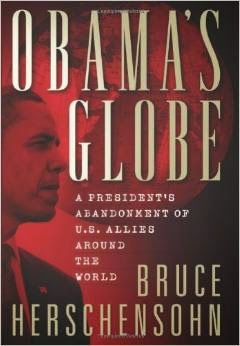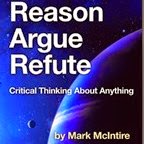An American Amnesia and Obama's Globe
Two Books by Bruce Herschensohn
--- Alexander Solzhenitsyn
As recent events in the Middle East amply demonstrate, America is not diplomatically, militarily, or morally capable of dealing with the worst threat to world peace since the Cuba missile crisis of the early 1960’s. Forty-seven U.S Senators are accused of meddling in President Obama’s Iran foreign policy. The President himself is accused of doing all he could to unsuccessfully overthrow Israel’s Prime Minister Benjamin Netanyahu during last week’s election. Snubs and counter-snubs have replaced diplomacy and political consensus. Quite apart from who’s right and who’s wrong, there is no unity of principle or action in today’s American foreign policy. In and of itself, that puts our globe at peril in the immediate future.
So, to gain some clarity and insight, THE MEDDLESOME PRIEST went to lunch to pick the best brain in American foreign policy today, Bruce Herschensohn. It was a sobering lunch interviewing Bruce about his latest book, OBAMA'S GLOBE: A PRESIDENT’S ABANDONMENT OF U.S. ALLIES AROUND THE WORLD. For you non-wonks, Bruce is Senior Fellow at Pepperdine University Graduate School of Foreign Policy and praised by two past U.S Presidents as the 'Dean of American Foreign Policy Advisors’. During his USIA Directorship, the agency received an Academy Award for “Czechoslovakia: 1968.” This latest book documents Obama's abandonment of U.S allies around the world. It follows his previous publication, AN AMERICAN AMNESIA: HOW THE U.S. CONGRESS FORCED THE SURRENDER OF SOUTH VIETNAM AND CAMBODIA. Since the two books are a continuing conversation about the lost principles of American foreign policy, both books are discussed here interactively.
AN AMERICAN AMNESIA opens with the claim that, in a series of misguided votes, the U.S. Congress refused to give support to the South Vietnamese which led to the slaughter and imprisonment of millions in Vietnam and Cambodia. In doing so, Congress undermined the foreign policy principles affirmed by all U.S Presidents from Washington to Nixon. Those principles are as simple as they are profound; be loyal to your friends and merciless to your enemies. The unexpressed predicate for these principles is the affirmation that the President of the United States (POTUS), as Commander-In-Chief, has absolute power to conduct American foreign policy without interference from any other branch of Congress. So said the 1799 Logan Act.
In 1973, through the negotiations of Dr. Henry Kissinger, the North Vietnamese and South Vietnamese governments agreed in the Paris Peace Accords to end the decade-old Vietnam War. If you held the view that North Vietnam was the original aggressor by invading South Vietnam using both Viet Cong and regular army troops, then the Paris Peace Accord meant that President Nixon ‘won’ the war in preserving the sovereignty of the south. If you held the view that the South Vietnamese government was a puppet regime propped up by President Lyndon Baines Johnson on the pretext of a phony ‘Gulf of Tonkin’ resolution, then the Paris Treaty meant that President Nixon merely ‘ended’ the war. Professional diplomats and military analysts were of the former view. Professional media personalities, fueled by leftist academics, were of the later view. Since leftist academics and media educate our young, Herschensohn argues, successive generations of Americans continue to believe that South Vietnam and America lost the war. They didn’t, he insists, they tragically lost the peace that followed the war. The word difference between ‘winning’ and ‘ending’ was important, in Herschensohn’s view, since it set the stage for the fundamental abandonment of foreign policy principles under President Obama. As one of the reviewers of the book on Amazon.com puts it:
I am so very grateful for this book. My late husband was awarded a silver star as a platoon leader in Vietnam in 1965-66, and was always so frustrated to hear the standard line that the US lost the war.
I am a school librarian and have looked in vain for suitable material that acknowledges that we won the war, and that then the Democratic majority in the US Congress reneged on the peace terms allowing Southeast Asia to fall to the communists two years later, resulting in more deaths in that first year of communist rule than in the 10 years of our engagement in Vietnam.
I have even found Vietnam veterans who were surprised when I have said we won the war and then Congress gave it away. They have heard for 30 years about the war that we "lost." But when they hear just a few of the facts, they acknowledge that that is truly the case. President Nixon won incredible concessions from the communists that would have given South Vietnam self-rule. Democratic Congressmen gave it away in 1975 and American press "credited" the military. A third of the population of Cambodia paid with their lives and Southeast Asia lost their opportunity for self-rule
This is the setting for the second book, Obama’s Globe. In Chapter 2, The World at War, Herschensohn returns to that distinction between ‘winning’ and ‘ending’ a war.
“ Historically and logically, one side walking away from a war that’s being fought frees the path for the other side to win. Walking away may interrupt wars for a period of time, but those periods only serve as intermissions before the side that didn't walk away wins.” (page 6)
Not only did candidate Obama announce that the United States would ‘end’ the war in Iraq, but President Obama actually told the enemy the date for America’s walkout. That ensured that the Sunni/Shia civil war would not be won by forces friendly to democratic stability in that country. Ultimately, Herschensohn argues, it was Obama’s ‘walking away’ from Iraq rather than George Bush’s ‘Mission Accomplished’ that watered the roots of ISIL terrorizing the region and the world today.
In the Afghan war, Obama doubled down on his war policy with “As commander-in-Chief, I have determined that it would be in our vital national interest to send an additional 30,000 troops to Afghanistan. After 18 months, our troops will begin to come home.” This past February 10th , the White House announced plans to slow the planned withdrawal from Afghanistan for the second time in as many years. Wars are seldom won according to watches, Herschensohn observes. ISIL reality proves him right and Obama wrong. But that’s just the beginning. The rest of the book exposes the illogic of Obama’s global view in excruciating detail. Why can’t Obama even pronounce ‘Islamic terrorism’ to describe what is obviously the perverted motive for IS barbarism? Because the president thinks Americans have committed comparable acts of ‘terrorism’ such as Timothy McVey in the Oklahoma bombing in 1995 and the shooting of Congresswoman Gabrielle Giffords in 2011. Obama is reality challenged in these equivocations, Herschensohn believes, and he spares no feelings for those who share the President’s malady.
Near the end of Obama’s Globe, Herschensohn restates those principles and values of American foreign policy that have guided all American presidents to world primacy from Washington to Clinton. His restatement is both full-throated and unapologetic. Without spoiling the good read, here’s a highlight.
“ Mahmoud Ahmadinejad of Iran said, “We shall soon experience a world without the United States.” His superior, the Ayatollah Khamenei said that “ The United States will soon be defeated.” … If the United States stops its world leadership the world will find out why it shouldn't have stopped…. But every Chief of State around the world knows that the United States will never use the power it has. Therefore, the United State is less powerful than those who have fighters with ambitions to by martyrs, and have primitive weaponry, having at times chosen airlines in flight as functional missiles in their otherwise 14th century arsenals.” (page 171)
Harry Truman, a traditional Democrat president, made famous the nostrum; “If you can’t stand the heat, then get out of the kitchen”. If Bruce Herschensohn is right, then President Obama is unable to find the kitchen let alone stand the heat.
I once asked Charlton Heston what advice he gave to his children each morning when he sent them off to school. “Be loyal to your friends, and keep your promises.”, he told me. His son, Fraser, confirmed that to me on several occasions. Too bad these principles and values are no longer the predicates for American foreign policy.









Comments
Post a Comment
Dear reader,
I hope you will leave a comment regardless of content...I learn something from all comments regardless of agreement or disagreement.
Thank you for your kindness.
--- Mark McIntire